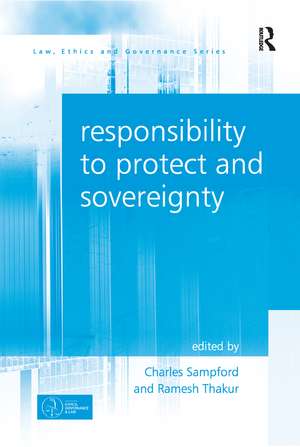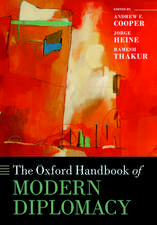Responsibility to Protect and Sovereignty
Autor Ramesh Thakur Editat de Charles Sampforden Limba Engleză Paperback – 9 sep 2016
| Toate formatele și edițiile | Preț | Express |
|---|---|---|
| Paperback (1) | 465.31 lei 6-8 săpt. | |
| Taylor & Francis – 9 sep 2016 | 465.31 lei 6-8 săpt. | |
| Hardback (1) | 1058.65 lei 6-8 săpt. | |
| Taylor & Francis – 16 dec 2013 | 1058.65 lei 6-8 săpt. |
Preț: 465.31 lei
Nou
Puncte Express: 698
Preț estimativ în valută:
89.05€ • 91.19$ • 74.07£
89.05€ • 91.19$ • 74.07£
Carte tipărită la comandă
Livrare economică 19 martie-02 aprilie
Preluare comenzi: 021 569.72.76
Specificații
ISBN-13: 9781138245921
ISBN-10: 1138245925
Pagini: 246
Dimensiuni: 156 x 234 x 13 mm
Greutate: 0.36 kg
Ediția:1
Editura: Taylor & Francis
Colecția Routledge
Locul publicării:Oxford, United Kingdom
ISBN-10: 1138245925
Pagini: 246
Dimensiuni: 156 x 234 x 13 mm
Greutate: 0.36 kg
Ediția:1
Editura: Taylor & Francis
Colecția Routledge
Locul publicării:Oxford, United Kingdom
Cuprins
Introduction 1. A Philosophical Underpinning for a State’s "Responsibility to Protect" 2. Intercultural Judgement and The Role of a Sensus Communis 3. Hannah Arendt’s "Right to Have Rights" and Human Security 4. The Scope of the "Responsibility to Prevent": A Remit for Intervention? 5. The Legal Character of the Responsibility to Protect 6. Distant Strangers and Our Responsibility to Protect
Notă biografică
Professor Charles Sampford topped law, politics and philosophy at Melbourne and combined those disciplines in an Oxford DPhi. He was approached to become Foundation Dean of Law at Griffith University in 1991. He led the 1998 bid for the Key Centre for Ethics, Law, Justice and Governance (the only Australian centre in law or governance to receive centre funding from the Australian Research Council) and was its Foundation Director for six years. In September 2004, he became the Director of the Institute for Ethics, Governance and Law, a joint initiative with the United Nations University, Griffith, ANU, and other universities. Foreign fellowships include Visiting Senior Research Fellow in Oxford and a Senior Fulbright to Harvard. Professor Sampford has written 117 articles and chapters and has completed 26 books and edited collections. In June 2008, his work was recognized by the ARC who invited the 20 researchers they thought had most clearly ’made a difference’ to the Graeme Clarke Outcomes Forum held at Parliament House, Canberra. Professor Ramesh Thakur is Director of the Centre for Nuclear Non-Proliferation and Disarmament, Australian National University. Educated in India and Canada, he was a professor at the University of Otago in New Zealand and then Head of the Peace Research Centre at the ANU, during which time he served as an adviser to the Australian and New Zealand governments on arms control, disarmament and international security issues. He was later Senior Vice Rector of the United Nations University (and UN Assistant Secretary-General), a Commissioner and principal author of ’The Responsibility to Protect’; principal writer of Secretary-General Kofi Annan’s second UN reform report; and professor at the University of Waterloo, Distinguished Fellow of the Centre for International Governance Innovation and Foundation Director of the Balsillie School of International Affairs in Waterloo, Ontario. The author/editor of over 40 books and 400 art
Recenzii
’Events from Kosovo in the 1990s to Syria today make it clear that we need a renewed focus on responding to massive threats to human life. Responsibility to Protect and Sovereignty offers a timely and focused response to policy and legal challenges and is a necessary and important read.’ Philippe Sands, University College London, UK ’As the world continues to witness mass atrocities against innocent populations, this book helps us understand the obstacles to effective life-saving interventions. It illuminates the promise of the Responsibility to Protect as a concept that can help every nation on earth fulfill its cardinal duty to protect its own citizens from genocide, war crimes, crimes against humanity and ethnic cleansing.’ Abiodun William, President, The Hague Institute for Global Justice, Netherlands
Descriere
This book examines interventions in East Timor, Sri Lanka, Sudan and Kosovo. The chapters explore and question UN debates about the doctrine of the responsibility to protect, both before and after its adoption in 2005, contrast state attitudes to international military intervention and analyse what takes place after intervention. It also discusses the ability of the Security Council to access reliable information and credible and transparent processes to enable it to make a determination on the occurrence of atrocities in a Member State.

